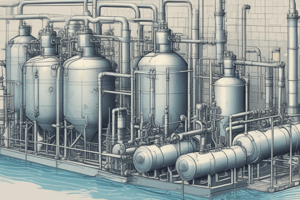Podcast
Questions and Answers
What is the equation to calculate the temporary hardness in terms of calcium carbonate equivalents?
What is the equation to calculate the temporary hardness in terms of calcium carbonate equivalents?
- Temporary hardness (in mg/L as CaCO3) = (Chemical equivalent x producing hardness) / Strength of substance (correct)
- Temporary hardness (in mg/L as CaCO3) = Strength of substance / (Chemical equivalent x producing hardness)
- Temporary hardness (in mg/L as CaCO3) = Chemical equivalent x producing hardness x Strength of substance
- Temporary hardness (in mg/L as CaCO3) = Chemical equivalent / (Strength of substance x producing hardness)
What is the relationship between parts per million (PPM) and Degree French?
What is the relationship between parts per million (PPM) and Degree French?
- 1 PPM = 1 Degree French
- 1 PPM = 0.5 Degree French
- 1 PPM = 0.07 Degree French
- 1 PPM = 0.1 Degree French (correct)
How can the total permanent hardness be calculated in terms of calcium carbonate equivalents?
How can the total permanent hardness be calculated in terms of calcium carbonate equivalents?
- Total permanent hardness (in mg/L as CaCO3) = Permanent magnesium hardness / Permanent calcium hardness
- Total permanent hardness (in mg/L as CaCO3) = 2 * Permanent magnesium hardness
- Total permanent hardness (in mg/L as CaCO3) = Permanent magnesium hardness + Permanent calcium hardness (correct)
- Total permanent hardness (in mg/L as CaCO3) = Permanent magnesium hardness - Permanent calcium hardness
What is the unit for expressing water hardness in the text?
What is the unit for expressing water hardness in the text?
What is the chemical equivalent of a substance producing water hardness measured in mg/l as CaCO3?
What is the chemical equivalent of a substance producing water hardness measured in mg/l as CaCO3?
Flashcards are hidden until you start studying





